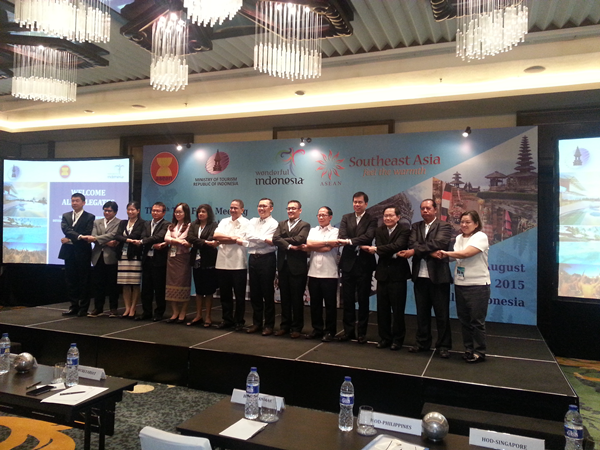
The ASEAN-China Centre (ACC) participated in the 4th Task Force Meeting on the Development of ASEAN Tourism Strategic Plan 2016-2025, which was held on 4-5 August 2015 in Bali, Indonesia. H.E. Dr. Ir. Arief Yahya, Minister of Tourism of Indonesia, attended the meeting and delivered the Opening Remarks. Representatives from the National Tourism Organizations (NTOs) of 10 ASEAN Member States, ASEAN Secretariat, United Nations World Tourism Organization, World Tourism and Travel committee, Pacific and Asia Tourism Association, ASEAN-China Centre, ASEAN-Japan Centre and ASEAN-Korea Centre attended the meeting. ACC was represented by Tourism officer, Mr. Liu Xiaohu and Mr. Bai Xuebing of GACD.
During the Meeting, the participants were briefed by ASEAN Secretariat on the drafting progress of ATSP 2016-2025. Presentations were also made by relevant representatives on the following 3 topics: 1) A review of ATSP 2011-2015, 2)Current situation, prospect and main obstacles of the tourism industry in ASEAN, and 3)The general framework of ATSP 2016-2025, and its strategic directions as well as priority-working areas.
The Meeting highlighted that the rapidly developing tourism industry had already become an important component of the economies of ASEAN Member States. Serving as a blueprint, the ATSP 2011-2015 had provided important reference for policy making for NTOs in ASEAN Countries. According to World Travel and Tourism Committee (WTTC), the tourism in Cambodia, Laos, Malaysia, the Philippines and Thailand had account for more than 10 percent of GDP and contributes significant employment in their economy. United Nations World Tourism Organization (UNWTO) predicted that the total international arrivals to ASEAN were expected to increase to 123 million by 2020, 152 million by 2025 and 187 million by 2030.
The Meeting pointed out that, for the realization of sustainable and rapid development of ASEAN Tourism, there were still core challenges that need to be addressed, which were raised during the Group Discussion, as follows: creating a better balance in the distribution of the benefits of tourism between the Member States; reducing concerns over safety and security; making cross border formalities more convenient and less costly; reducing transportation and destination infrastructure congestion; reducing the high cost of travel industry services in the region; increasing participation by local communities in the tourism value chain especially in the less developed yet tourism resource rich portions of the region; developing destinations that are inclusive, green and knowledge-based.
To overcome these challenges accordingly, two strategic directions were identified in the general framework of ATSP 2016-2025, including to enhance ASEAN competitiveness as a single destination and to ensure more sustainable and inclusive tourism. The Meeting underlined 10 priorities for future work of the tourism industry among ASEAN Member States under these two strategic directions, which were identified as follows; marketing of Southeast Asia, quality tourism, human resource development, tourism investment, connectivity and infrastructure, travel facilitation, mainstreaming community participation, tourist safety, environment and climate change.
During the meeting, representatives of ACC had very active exchanges with the host and relevant participants of the meeting and took part in discussions during the workshops. Mr. Liu Xiaohu, tourism officer of ACC also briefed the meeting on the efforts of ACC in promoting tourism exchanges between ASEAN Countries and China. He also suggested ASEAN tourism industry to develop more new tourism products that would fit the need and consuming habits of different generations of Chinese travelers.
The Meeting was of great significance and vast information was obtained that would benefit ACC future works in efforts to promote ASEAN tourism, provide a more solid foundation for enhancing tourism cooperation between ASEAN and China.